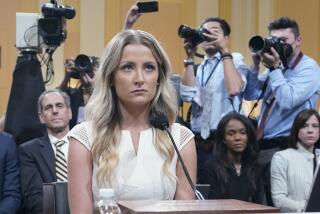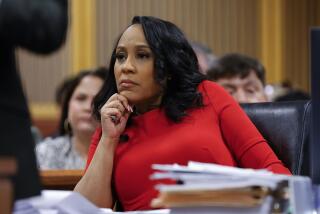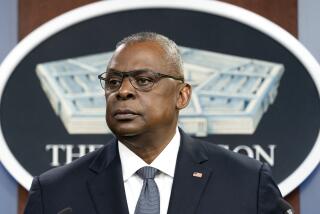Standing close to Trump puts aides in the firing line
Adm. Ronny Jackson had a shining career up until the day President Trump tapped him as the nominee to head the nation’s perennially troubled Veterans Affairs Department.
In the space of a month, Jackson has gone from the accomplished, telegenic and widely admired White House doctor for three presidents to a disgraced nominee dogged by allegations of misconduct.
Washington’s fierce political battles always chew people up, but the Trump administration seems headed for a record on the number of early casualties. Jackson’s case underscores several of the reasons.
Sign up for the Essential Politics newsletter »
THE ACCIDENTAL NOMINEE
By the time Trump fired the previous VA secretary, David Shulkin, the conservative campaign for a change at the top of the VA had been underway for months.
Since February, when a report from the VA inspector general sharply criticized a trip Shulkin and his wife took to London at taxpayer expense, his opponents had stepped up their campaign to oust him. By mid-March, the White House had clearly signaled that he had lost his fight to hang onto the job.
And, yet, the administration, distracted at the top and divided by numerous rivalries, had no clear succession plan even though Trump has repeatedly described care of the nation’s veterans as a top priority.
On March 28, when Trump tweeted word of Shulkin’s firing, he surprised even much of his staff by naming Jackson, a man with no major management experience, no known positions on the issues facing the VA and no previous vetting for a major political appointment.
The nomination was greeted by a puzzled silence in the Senate. When it all began to fall apart this week, the only surprise was that the end hadn’t come faster.
On Tuesday, with a flood of misconduct allegations becoming public and senators postponing Jackson’s confirmation hearing, Trump openly nudged his nominee to withdraw, as Cathy Decker and Noah Bierman wrote.
“I told Adm. Jackson just a little while ago … I said, ‘What do you need this for?’ ” Trump said.
As is often the case, the nominee wasn’t immediately prepared to accept his fate, and for a day or so, the White House mounted a defense.
But by Thursday, Jackson bowed to the inevitable and withdrew, issuing a blanket denial of the accusations against him as “completely false and fabricated,” but not addressing any of the specifics.
A LENGTHENING LIST
But what was most telling about Jackson’s fall was that he wasn’t Trump’s biggest personnel problem — not even of this week.
On Capitol Hill, the news of Jackson’s withdrawal had to compete with hearings at which Environmental Protection Agency chief Scott Pruitt defended himself against a list of misconduct allegations that appears to grow by the day.
As Evan Halper reported, Pruitt offered lawmakers little contrition and encountered tough questions not only from Democrats, but from some Republicans over questionable spending and management decisions. At least 10 separate investigations of Pruitt’s conduct are under way.
Trump has stuck by Pruitt so far. He admires the former Oklahoma attorney general’s ability to dismantle Obama-era environmental regulations and the zeal with which Pruitt has pursued the pro-coal, pro-oil agenda.
This week, for example, Pruitt proposed a major new rule that would block EPA now and in the future from considering a wide range of scientific studies when developing new regulations.
As Halper wrote, the proposal, which would particularly limit the agency’s ability to look at health data, aims to put into effect a ban that conservatives have failed to get through Congress.
Earlier this month, the Senate confirmed Trump’s nomination of Andrew Wheeler, a former coal-industry lobbyist, to the EPA’s No. 2 position. With him now in place, Pruitt’s tenure seems increasingly tenuous.
STORMY TIMES FOR COHEN
Then there’s Trump’s longtime personal lawyer, Michael Cohen, who was back in court in Manhattan this week in proceedings related to the criminal investigation he faces.
In a now-familiar pattern, Trump has sought to minimize his ties to Cohen. Prosecutors are “looking at something that has to do with his business. This doesn’t have to do with me,” Trump said in an interview Thursday on “Fox & Friends.”
“He has a percentage of my overall legal work, a tiny, tiny little fraction,” Trump declared.
As Joe Tanfani reported, prosecutors in New York within hours presented that remark to federal district judge Kimba Wood as evidence that Cohen’s office files, which the FBI seized in a series of court-approved raids on April 9, probably don’t contain a lot of privileged attorney-client information related to Trump.
With prosecutors’ agreement Thursday, Wood appointed a New York attorney and former federal judge, Barbara S. Jones, to be a special master in the case, giving her the authority to review Cohen’s files to decide which remain shielded by privilege.
In making that appointment, Wood rejected Trump’s argument that he should have the right to review the files first and shield whichever ones he felt should be withheld.
In the “Fox & Friends” interview, Trump admitted that Cohen “represented me” in negotiations with Stormy Daniels, the porn actress who received a $130,000 payment during the 2016 campaign to keep quiet about her allegations of having had an affair with Trump.
Cohen had insisted that Trump didn’t know about his negotiations with Daniels.
Also in the “Fox & Friends” interview, Trump criticized the FBI and threatened the Russia investigation.
“I’m very disappointed in my Justice Department,” he said, as Decker reported.
“I have decided that I won’t be involved. I may change my mind at some point, because what’s going on is a disgrace.”
THE COMMON FACTORS
What the Jackson, Pruitt and Cohen cases have in common is Trump’s disregard for ethical and legal norms that call for careful vetting of people chosen for high-level posts or that seek to restrain their behavior.
The other common factor: It’s the people standing next to Trump who have paid the price — at least so far.
Trump’s hardly unique among presidents in that regard. The scandals of President Bill Clinton’s administration, for example, took a toll on many of his appointees.
Where Trump stands alone, however, is in the number of high-level appointees and close associates who have entered the administration as well regarded, successful people and left with their reputations damaged, sometimes severely. Unsurprisingly, that pattern makes recruiting of replacements increasingly difficult.
GRAPPLING WITH IRAN AND NORTH KOREA
Trump regards his diplomacy with North Korea as among his administration’s top successes. As Laura King reported, he bristles at criticism of his planned summit with Kim Jong-Un.
“Wow, we haven’t given up anything,” Trump tweeted last weekend. By contrast, he said North Korea had “agreed to denuclearization.”
That’s not accurate. The North Koreans have agreed to talk about denuclearization, but as Tracy Wilkinson wrote, there’s little evidence that they plan to get rid of their entire nuclear arsenal. There’s considerable evidence that Kim believes he is acting from a position of strength.
The North Koreans have largely accomplished their goal of building and testing a small nuclear force. So their willingness to suspend tests, for example, isn’t much of a concession.
The U.S., meanwhile, has agreed to something that North Korea has long sought — a meeting with a U.S. president.
Even as Trump seeks a nuclear deal with North Korea, the leaders of France and Germany have come to Washington trying to persuade him to maintain the existing nuclear deal with Iran, as Wilkinson and King wrote.
French President Emmanuel Macron arrived Tuesday and did his best to talk Trump into preserving the Iran deal. As Bierman reported, Trump has formed a close bond with Macron, but sounded like a man who might yet disappoint his friend.
German Chancellor Angela Merkel arrived in Washington on Thursday and meets with Trump today.
In time for her arrival, the Senate confirmed Trump’s ambassador to Germany, Richard Grenell, and also gave final approval to Mike Pompeo as Trump’s second secretary of State.
After meeting with Trump, Macron spoke to a joint meeting of Congress, where he gave a speech that strongly challenged Trumpism, as Decker wrote.
“We have two possible ways ahead,” Macron said. “We can chose isolationism, withdrawal and nationalism…. as a temporary remedy to our fears.”
“But closing the door to the world will not stop the evolution of the world,” he added. “It will not douse, but inflame, the fears of our citizens.
A NAFTA DEAL AHEAD
Trump has often talked about pulling out of NAFTA, the trade agreement with Mexico and Canada. But as Don Lee reported, his administration is now pushing hard to reach a new NAFTA agreement, with the announcement of a deal possible in the next few days.
U.S. Trade Representative Robert Lighthizer wants to get a deal done quickly so that Congress would have time to approve it late this year, during a lame-duck session, Lee reported.
The Canadian and Mexican trade ministers have canceled other plans to stay in Washington for negotiations through the weekend.
MELANIA’S DEBUT
As first lady, Melania Trump has largely avoided the spotlight, but this week, as Decker wrote, the shroud of invisibility lifted.
After hosting the Japanese prime minister and his wife at Mar-a-Lago last week, Melania Trump represented the administration at the funeral of former First Lady Barbara Bush in Houston; the president, whom the Bushes disliked, stayed away.
On Tuesday, two days before her 48th birthday, Melania Trump dominated images of the first state dinner of the administration with a striking white hat that became the launching point for a thousand semiotic theories.
As a former model, the first lady unquestionably understands that her wardrobe sends messages. White hats denote the good guys, that much is clear. Who was she identifying as the villain?
TRAVEL BAN FARES WELL AT HIGH COURT
Trump’s third try at his much-disputed order restricting travel to the U.S. from several mostly Muslim countries seemed to pass muster at the Supreme Court, David Savage reported.
Justices Elena Kagan and Sonia Sotomayor asked tough questions, but the court’s four solid conservatives and its swing voter, Justice Anthony M. Kennedy, seemed convinced that the travel order was a valid exercise in presidential power.
The high court likely will issue a final decision on the case by late June.
FARM VOTE REMAINS SOLID
As Geoff Mohan wrote, one might assume that Mike Poindexter, a walnut grower in the San Joaquin Valley town of Selma, would be regretting his vote for Trump.
Since the inauguration, immigration officials have raided his office and Trump’s tariffs against China have brought retaliation against U.S. walnut exports.
But “what is our other option?” Poindexter asked. Democrats are “not willing to back [Sen. Dianne] Feinstein because she’s not liberal enough. They don’t have anyone who’s palatable to us,” he said.
Poindexter’s reaction goes a long way toward explaining why, trade war or no, the country’s farm regions aren’t likely to desert Trump any time soon.
“I don’t think you’ll have farmers go out and vote for Democrats over tariffs,” he said.
LOGISTICS
That wraps up this week. My colleague Christina Bellantoni will be back Monday with the weekday edition of Essential Politics. Until then, keep track of all the developments in national politics and the Trump administration with our Essential Washington blog, at our Politics page and on Twitter @latimespolitics.
Send your comments, suggestions and news tips to politics@latimes.com.
If you like this newsletter, tell your friends to sign up.
More to Read
Get the L.A. Times Politics newsletter
Deeply reported insights into legislation, politics and policy from Sacramento, Washington and beyond. In your inbox three times per week.
You may occasionally receive promotional content from the Los Angeles Times.







